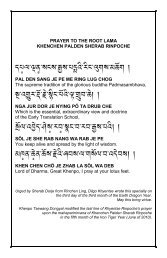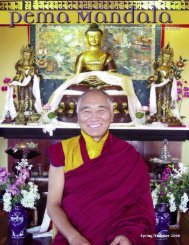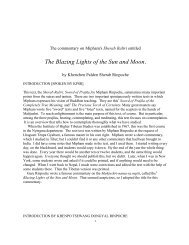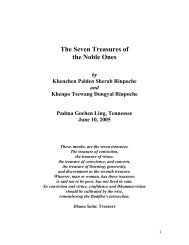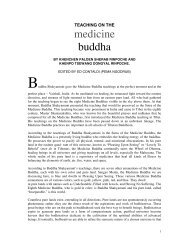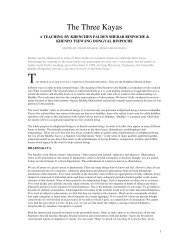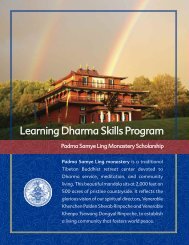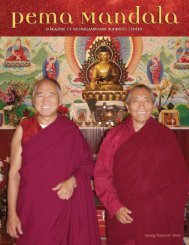6 Pema Mandala Spring 07:Pema Mandala - Padmasambhava ...
6 Pema Mandala Spring 07:Pema Mandala - Padmasambhava ...
6 Pema Mandala Spring 07:Pema Mandala - Padmasambhava ...
Create successful ePaper yourself
Turn your PDF publications into a flip-book with our unique Google optimized e-Paper software.
ligence, wisdom, love, compassion, and goodness.<br />
The Buddha appreciated and emphasized the importance of<br />
courage and commitment, patience and tolerance. “Tolerance”<br />
means the ability to let things come and let them go. As stated<br />
in the Dzogchen teachings, liberating phenomena as they arise<br />
brings about perfect tolerance and patience. Nothing is going to<br />
last forever, since all is impermanent. Practicing with the support<br />
of these beautiful thoughts makes our meditation meaningful.<br />
Glorious Conqueror Shakyamuni often taught that all practitioners<br />
should uphold and develop the “Eight Intentions of<br />
Great Beings.” Once again, we may not be able to immediately<br />
accomplish all these courageous intentions, but it is important<br />
to generate the willingness to engage in them. We should continue<br />
to open our hearts to these practices.<br />
1The first intention is the willingness in the heart of every<br />
practitioner to remove the suffering of all living beings. We<br />
should always keep this foremost in our awareness.<br />
2The second intention is the willingness to lead every living<br />
being to the ultimate state of prosperity and happiness,<br />
which is buddhahood.<br />
3The third intention is the willingness to use our bodies in<br />
the service of making good things for both ourselves and<br />
others. Instead of using our bodies for any and everything, we<br />
should use them to benefit all beings.<br />
4The fourth intention is to always keep in mind the suffering,<br />
difficulties, and troubles associated with the six realms.<br />
Among these realms, the inhabitants of the lowest three experience<br />
the most difficulty. Therefore, we should help and serve<br />
these beings as much as we can. Of course, more immediately<br />
we can help animals, since we share a strong connection and<br />
are in close contact with these beings. So, the fourth intention<br />
is to maintain the powerful thought in our hearts and minds<br />
that we are going to help dispel the suffering and solve the problems<br />
of all beings in the three lower realms, especially animals,<br />
as much as the situation allows.<br />
5The fifth intention that we as practitioners should always<br />
guard in our hearts and minds is to be instrumental in bringing<br />
happiness and peace to all living beings by removing their<br />
difficulties, not just now, but throughout each of our future<br />
lives. Wishing and praying that throughout our lifetimes we will<br />
be able to continually help all beings through the actions of our<br />
bodies, speech, and minds is the fifth intention.<br />
6The sixth intention is that we are ready and willing to<br />
exchange our joy, peace, and happiness for the difficulties<br />
and troubles of others. We have the capability and opportunity<br />
to actualize this intention through the practice of tonglen.<br />
The openness and willingness to engage in these actions is<br />
the sixth intention.<br />
7The seventh intention is to be able to fulfill the wishes of<br />
every living being in answer to their needs. It is the wish that<br />
we may fulfill their hopes according to the Dharma, so that they<br />
will benefit and thus be able to benefit all other sentient beings.<br />
8The eighth and final intention is to achieve enlightenment—buddhahood—for<br />
the sake of all beings.<br />
Regardless of the title we give these intentions, whoever has<br />
the willingness to engage in these activities is a bodhisattva, a<br />
great and beautiful being. As you all know, the best foundation<br />
for these intentions is bodhichitta, which is filled with courage,<br />
commitment, and openness. By keeping and igniting these<br />
thoughts as much as we can, we will become beautiful followers<br />
of the Buddha. When we read the life stories of all the great<br />
ancient masters, we see that this is the same teaching they<br />
taught and practiced themselves, following in the noble footsteps<br />
of the Awakened One.<br />
The essence of the Eight Intentions of Great Beings is one<br />
hundred percent unconditional love, compassion, and wisdom.<br />
Therefore, these intentions have no connotation of violence,<br />
negativity, deceit, or the intention to disturb or take advantage<br />
of others. Rather, they represent the authentic nature of the<br />
absolute Dharma, which is Dzogchen. We are practicing the<br />
Dharma whenever we are in touch with this willingness to benefit<br />
sentient beings as much as we can.<br />
Cultivating these intentions is not just beneficial for others:<br />
these wonderful thoughts will also help remove our own obscurations,<br />
obstacles, and negativities. They will fulfill our own<br />
wishes and goals. For this reason, these bodhisattva intentions<br />
are known as methods to accumulate merit. Upon developing<br />
them, we build up beautiful energy in our mindstreams and<br />
physical systems. It is this energy that will bring about realization,<br />
which is based upon our accumulation of true merit.<br />
Finally, our realization and bodhichitta will naturally reflect to<br />
and benefit others.<br />
Uniting these bodhisattva intentions with our practice of<br />
Dzogchen will establish a beautiful system of interdependent<br />
coordination that will ignite and accelerate our progress, thereby<br />
bringing benefit to all beings. We should never allow our<br />
Dzogchen meditation to stray from this foundation. By practicing<br />
in this way, our realization will flower and its fruit will ripen<br />
perfectly. This will make everyone, including ourselves, ever<br />
happy and joyful, and we will eventually become beautiful<br />
practitioners and great beings. Beginning our journey with this<br />
perfect foundation, we will conclude it in the same way, uncovering<br />
the innate liberated state in ourselves and all beings. ■<br />
The audio recording of this teaching, entitled “Virtue in Mind and<br />
Action,” is available as part of the Morning Dawn Study Series.<br />
SPRING/SUMMER 20<strong>07</strong> | <strong>Pema</strong> <strong>Mandala</strong> 13




